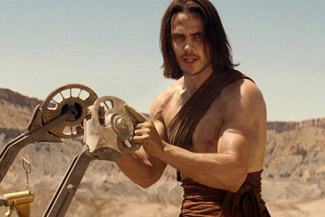Book vs. Movie: John Carter
By Russ Bickerstaff
March 14, 2012
The film shifts from Mars to old-timey period US. There’s Daryl Sabara as author Edgar Rice Burroughs dealing with the estate of John Carter and finding out just what a remarkable life he’s led. We then delve into a lengthy introduction to the character that seems a considerable expansion on what little appears in the book. Here we get a stronger feel for the character. Burroughs let the fantasy of the world bleed in right away. The film spends quite a bit of time establishing Carter as a fighter and a rugged individualist who is looking to make his fortune. There’s actually a great deal of back story here. It doesn’t appear to help the rhythm of the story at all, but it does establish mood.
Somewhere inside the first half hour of the film, Carter, does, in fact find himself on Mars, but not because of death or near death due to asphyxiation in a cave. No, *this* journey to Mars happens courtesy of some kind of magic jewel, which robs the story of some of its mystery. It’s all well and good to throw magic into the equation, but I think that the journey to Mars seemed that much more interesting when it seemed to be him going to the afterlife after a fight with natives. Here, he’s drawn to look more sympathetic to modern audiences and as a result, there’s more delicate rendering of the character needed 100 years after the character was created.
Then, things drift over to the red people of Mars, and while the costuming is really nice, it lacks the raw, naked sensuality of the original narrative. It’s kind of weird seeing the concept of fashion imposed on the culture - Lynn Collins is really beautiful and passionate in the role of Dejah Thoris, but the drama of the story detracts from the overall journey of discovery we find in the book. We’re not actually seeing the world through the eyes of someone like us. We’re seeing it through the uninspired lens of a group of filmmakers who didn’t seem terribly interested in taking the heart of the story to the heart of the movie.
The story of the original novel is intact here, but it’s buried underneath a heavy layer of storytelling that simply seams unnecessary. A big part of the appeal of the novel is the fact that it’s an introduction to a strange new world. Here, they seem to be ignoring that element of the film in favor of a more traditional fantasy sci-fi film. Princess of Mars isn’t bad like that. John Carter just is not terribly inspired.
The Verdict
The original novel was a breezy read that helped popularize space fantasy a t the dawn of the science fiction genre. It may not have originated everything that the genre consists of, but it was a powerful echo of certain aspects of fantasy that have remained popular to this day. A contemporary adaptation of the film doesn’t have the benefit of being an original. There have been so many other echoes of this story in so many other movies that it ends up feeling like a weak imitation of them.
The film cost $250 million. The early numbers roll in as I write these words and it looks very dismal for what could have been a much better film had it simply been framed a little closer to the heart of the book, which had its heart in exploration of strange new cultures rather than cheap drama.
Continued:
1
2
3
|
|
|
|




